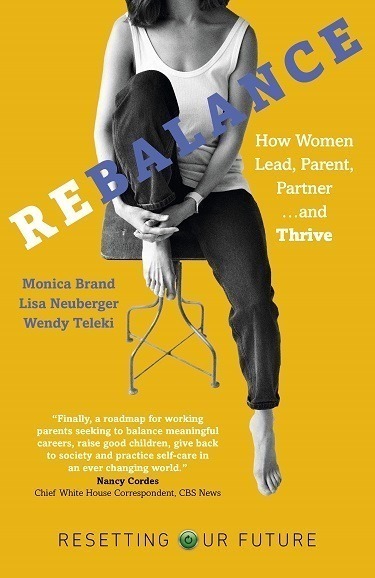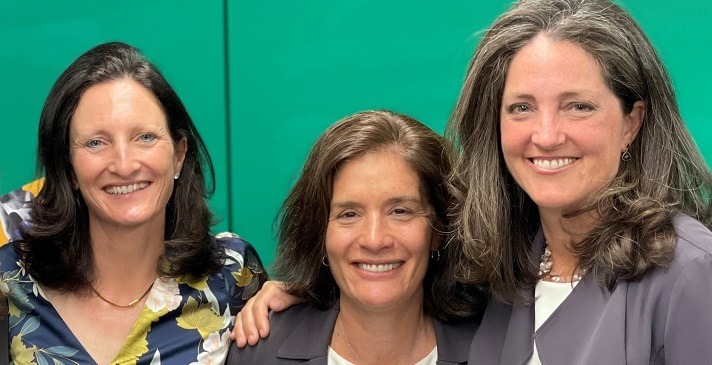New book provides practical guidance for women (and men) to rebalance our lifestyles and build Cognitive Reserve
 On one of our “walk and talks” around the lush trails of Rock Creek Park in DC surrounded by bikers, runners, cars and the occasional deer, Wendy and Lisa talked about aging. Wendy’s mother, who had her children in her early 20s, was still joining the family’s grueling summer hikes with her children and nine grandchildren well into her 60s. Wendy mused about how much older she would be when their kids could have their own kids. It dawned on her that her health was not just a here and now issue, but an investment in that future. We agreed to help each other cultivate the habits and make time to build strength as well as reserves, both physical and mental, for the long-term. Their goal: to enjoy being active in their 40s and 50s while also laying the groundwork to continue being active into their 60s, 70s, and beyond.
On one of our “walk and talks” around the lush trails of Rock Creek Park in DC surrounded by bikers, runners, cars and the occasional deer, Wendy and Lisa talked about aging. Wendy’s mother, who had her children in her early 20s, was still joining the family’s grueling summer hikes with her children and nine grandchildren well into her 60s. Wendy mused about how much older she would be when their kids could have their own kids. It dawned on her that her health was not just a here and now issue, but an investment in that future. We agreed to help each other cultivate the habits and make time to build strength as well as reserves, both physical and mental, for the long-term. Their goal: to enjoy being active in their 40s and 50s while also laying the groundwork to continue being active into their 60s, 70s, and beyond.
The idea of applying this reserve concept to physical and also mental health is powerful and attractive. Two years after Lisa’s luckily benign health scare, she found herself in another doctor’s office. This time it was with an orthopedic surgeon. After more than twenty years of waking up to morning runs multiple times per week, Lisa’s right knee suddenly started to smart and make clicking sounds on every step. For her, running was her happy, quiet place. Part of her morning routine to clear her mind with the meditative rhythm of repetitive steps. And a place to compose thoughts, rehearse speeches, or mull over conversations. The MRI had picked up a torn meniscus, a very common runner’s injury.
Lisa asked the orthopedist about the likely causes and what she could do about it. Dissatisfied with his “wear and tear” diagnosis – which she heard as “you are getting old and it’s all downhill from here” – she pushed for something she could fix, like a certain gait that could be altered. Months later when her ego started to mend and her knee started to heal thanks to more variety in her exercise routine (spin classes and bike rides), Lisa reset her perspective. Rather than feel sorry for herself and imagine her body in irreversible decline, she decided to consciously take steps to set a new normal of physical and mental health, a reserve, so that the future declines would be coming from a much higher baseline.
Building reserves is not just a physical issue, but also a mental one. Lisa’s husband, Álvaro, CEO and Editor-in-chief of SharpBrains, has impressed upon her the importance of building cognitive, emotional, neural, and mental resilience by harnessing lifelong neuroplasticity. Just as we develop cardio capacity, muscles, and core strength by doing circuit training and a range of physical exercises, we can build brain reserves with healthy nutrition, physical and cognitive exercise, stress regulation, curiosity, and lifelong learning. The cognitive reserve itself is made up of neurons and their connections patiently built day after day, year after year. Studies have shown that having a larger cognitive reserve serves as a “buffer” that helps people substantially delay symptoms of cognitive impairment and dementia even when Alzheimer’s markers are physically present in their brain.
Research shows that novelty, variety and challenge are key ingredients to strengthen neural pathways. Exercise helps with the generation of new neurons. Regulating stress helps protect those new neurons. In addition, the more we practice something, the more we strengthen neural connections, making them resilient and longer lasting. It turns out that one of the most rewarding and powerful way to stimulate our brain and build up our cognitive reserves is to cultivate a beginner’s mind. It is good news that enrollments spiked during the COVID-19 pandemic on a wide range of topics from learning Spanish on Duolingo, to baking on Tik Tok, or juggling on Masterclass. The more we learn and challenge ourselves, the more we create new neurons and fortify their connections. Neuroplasticity continues for our entire life. The earlier we start, the better; but it’s never too late to start.
Lisa’s husband also taught her a simple but powerful visualization exercise that takes only a minute or two and can entirely change your mood, helping to regulate stress. You touch your thumb to each finger while visualizing and fully recalling, little by little, four moments in your life. A moment of physical exertion. A loving exchange. An unexpected gift. The most beautiful landscape.
It is difficult to remain healthy when we are in an unhealthy environment, whether at work or at home. Early in the pandemic, there was a cascade of shutdowns globally as countries sought to contain the virus. Lisa found that the sense of losing control was palpable among team members from all corners of the globe, and it was compounding her own anxiety. She found solace in doing ten-minute guided meditations on her phone using her favorite Headspace app. One day, she decided to share the spirit with her team. She started her work calls with a quick, sixty second, guided meditation. While the exercise took only one minute, she saw from the reactions of colleagues how useful it was to create a space free of the whirling movies and worries in our minds. Instead of diverting time from the pressing needs of work, it turned out that taking a few moments of calm at the start of calls had a very positive effect. Creating space to center and clear the non-stop distractions of the pandemic made it easier to focus and be one’s best.
The more complex our lives are, the more we need simple things that can ground us and help us to be more resilient – to rebalance and rebalance and rebalance again. Building the mental muscles to find balance when one gets off balance is a critical skill thrive and to build cognitive reserve in our fast-changing times. As our monthly gatherings showed us over the years, practicing rebalance in good company not only reinforces neural pathways and capabilities but also strengthens the bonds of trust and confidence that are invaluable to build a healthy environment to thrive in.
– This is an adapted excerpt from the new book Rebalance: How Women Lead, Parent, Partner and Thrive (Changemakers Books; June 1st 2022) by Lisa Neuberger Fernandez, Monica Brand Engel and Wendy Jagerson Teleki, below.



